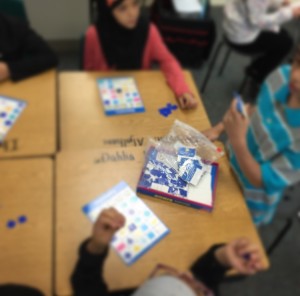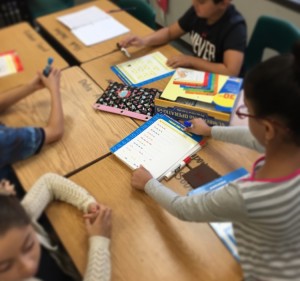Learning objectives for the week:
Math– Unit: Number and Operations in Base Ten, Represent & Interpret Data, and Fractions
Strand: 14.2 Number And Operations In Base Ten
Standard: 14.2.2 Represent And Interpret Data.
CCSS – GLCE: 14.2.2.1 4.MD.4 Make a line plot to display a data set of measurements in fractions of a unit (1/2, 1/4, 1/8). Solve problems involving addition and subtraction of fractions by using information presented in line plots. For example, from a line plot find and interpret the difference in length between the longest and shortest specimens in an insect collection.
| Ability to construct a line plot representing fractions |
|
| Ability to use line plots with fractions solving story problems involving addition and subtraction of fractions. |
|
| Knowledge of line plot and basic fractions such as 1/2, 1/4,1/8. |
|
Strand: 14.3 Number And Operations—Fractions
Standard: 14.3.1 Generalize Place Value Understanding For Multi-Digit Whole Numbers.
CCSS – GLCE: 14.3.1.2 4.NBT.2 Read and write multi-digit whole numbers using base-ten numerals, number names, and expanded form. Compare two multi-digit numbers based on meanings of the digits in each place, using >, =, and < symbols to record the results of comparisons.
| Ability to compare to numbers using greater than, less than, and equal to. |
|
| Ability to read and write larger whole numbers using numerals, words and in expanded form. |
|
Standard: 14.3.2 Use Place Value Understanding And Properties Of Operations To Perform Multi-Digit Arithmetic.
CCSS – GLCE: 14.3.2.1 4.NBT.4 Fluently add and subtract multi-digit whole numbers using the standard algorithm.
| Ability to apply a standard algorithm in both addition and subtraction problem |
English/ELA– Opinion Writing. Students will be researching a “hot topic” school issue like: Should Cell Phones Be Allowed In Schools? Should Students Have Homework? Student will then form an opinion and defend their opinion through their writing.
Reading– Building stamina. Stamina is the ability to sustain prolonged mental effort. In our class we will be building stamina with our independent reading during Daily 5. We rocked it at the end of the week with 30 minute stamina! Keep up the great work class!
Spelling– Students are expected to practice at home and at school daily in order to be prepared for our weekly spelling test on Friday.
Spelling words: Multisyllabic words- Long Vowels (0): owner, compose, joke, only, grow, hold, notice, whole vocal, compromise (please study all words, only some will appear on the test.)
Content Area Words: organism, light, energy, air, water (please study all words, all words will appear on the test.)
Science– Matter Unit. In this physical science unit students explore the properties of matter, emphasizing mass and volume. They further examine properties by comparing and contrasting states of matter (solid, liquid, gas).
Key Concepts for Science:
- spring scale
- grams
- kilograms
- balance
- volume
- liter (L)
- milliliter (mL)
- matter
- states of matter
- solid
- liquid
- gas
- definite (as related to shape)
- compare
- contrast
- mass
Social Studies– Regions Unit. We will be asking, “how does the geography of the United States affect the way people live?” Students will learn how to use geographic tools to identify, describe, and compare the physical and human characteristics of regions in the United States.
Region Focus this week: Mid-west (where we live)
Key Concepts for Social Studies:
- absolute location
- climate
- elevation
- human and physical characteristics of place
- political boundaries
- population density
- regions
- relative location
- spatial perspective
- special purpose maps
- topography
Homework:
- Read 40+ minutes daily. This may be broken up into smaller chunks of time if necessary.
- Practice math facts- times tables, metal addition & subtraction.
- Practice spelling words (listed below & in your child’s planner)
- Incomplete work– daily unfinished work may be sent home for students to complete and return the following school day. Your child is responsible for writing down incomplete assignments in his/her planner and for turning them in the next day.
- Handwriting – students may practice both manuscript, or “regular” handwriting, as well as cursive writing to help improve the neatness of their handwriting.
- Practice vocabulary– memorize the key concepts & their definitions for Science & Social Studies. Learning these terms will help you do well in class and on our tests.
Reminders:
Friday 10/16- Student Half Day
Coming up:
October 21st – in house DTE presentation
October 26th- Picture Day
November 5th- Music Field Trip



